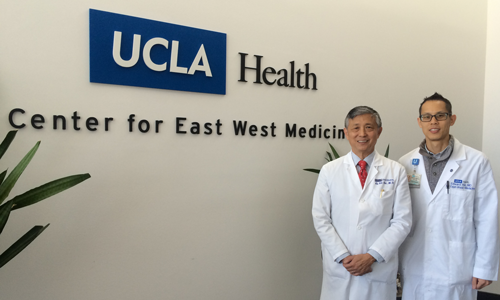 |
| MAA QUARTERLY, Spring 2016 |
Like Father, Like Son Edward Kwok-Ho Hui, M.D. ’01 (RES ’04, FEL ’06) is board-certified in internal medicine and geriatric medicine. His two-year VA-UCLA Geriatric Medicine Fellowship included training with the UCLA Center for East-West Medicine (CEWM). Currently, Dr. Hui is director of the East-West Primary Care program at CEWM, as well as associate clinical professor in the Division of General Internal Medicine and Health Services Research, UCLA Department of Medicine. Active in clinical care and teaching as a general internist with a background in integrative East-West medicine and geriatric medicine, Dr. Hui believes that primary care would benefit greatly from an increased appreciation of the values and utilization of the approaches championed by geriatrics and integrative East-West medicine and that they must play a role in the redesign of primary care going forward. My philosophy as a physician has certainly been greatly influenced by my father, Ka-Kit Hui ’71, M.D. ’75 (RES ’78, FEL ’79). In a sense, I was inspired to pursue medicine by virtue of my involvement in his early work in integrative medicine at UCLA. I now work tirelessly alongside him, as well as our colleagues and staff at the UCLA CEWM to deliver and disseminate our brand of integrative medicine.
UCLA Health’s strategic plan to expand outpatient care in the context of national healthcare reform highlights the demand for quality and affordable care at every level with a focus on value. Our efforts over the past several years to reorganize and expand the long-existing consultative and treatment clinic at the CEWM into a one-stop, full service, integrative East-West health center is our attempt to deliver such care and work toward the Institute for Healthcare Improvement’s triple aim—improving the patient’s experience of care, improving the health of populations and lowering costs. This integrative medicine-flavored, patient-centered medical home will help satisfy the growing demand for high-level generalists who practice integrative medicine. It will empower patients to develop optimal health and well-being through an academic-based model of primary care rooted in the principles of individualized disease prevention, holism, integrative medicine and traditional Chinese healing philosophy. While we have shown integrative East-West medicine to be helpful for patients with advanced disease with its ability to offer symptom relief, palliation with less toxicity and rebuild infrastructure that is in disrepair, its real strength may lie in its ability to intervene at an earlier stage in the continuum of health and disease. The hope is that this early intervention will effectively address most problems in the primary care setting and help patients avoid a path or trajectory that sometimes involves expensive and unnecessary evaluation and therapeutic misadventure with worst-case outcomes. I am confident that our approach can add more value to UCLA Health’s Primary Care Innovation Model, which supports the UCLA Accountable Care Organization by extending beyond the primary care clinics to incorporate community-based services and pre-primary care services, reaching patients earlier and more affordably in their homes and communities and markedly reducing unnecessary physician and emergency room visits. After all, a focus on prevention and wellness and preference for low-tech, low-cost and high-touch treatments is what most of our patients really want—it certainly helps that this is what those who pay for healthcare these days also want. To learn more about integrative medicine, visit exploreim.ucla.edu. |
|
Follow the Medical Alumni Association    |
